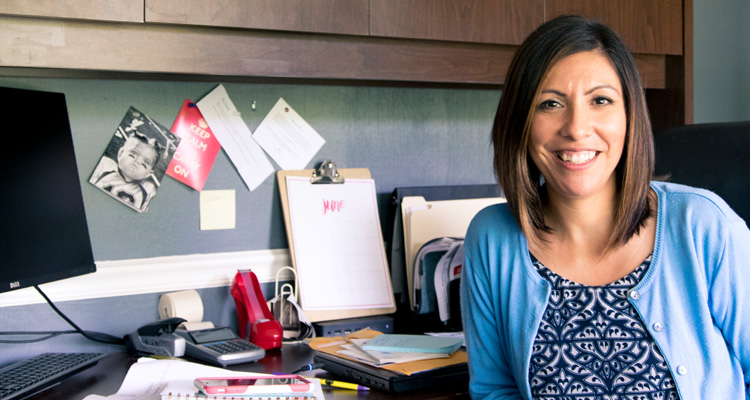Whether your summer was jam-packed with activities or filled with complaints about being bored with nothing to do, kids often have a tough time making the back-to-school transition.
Here are some tips for both parents and kids to make the change easier on both.
For Parents:
As with any new or potentially unsettling situation, like starting school for the first time or entering a new grade or a new school, allow your kids time to adjust. Remind them that everyone feels a little nervous about the first day of school and that all will become routine before they know it.
Be sure to emphasize the positive things about going back to school such as hanging out with old friends, meeting new classmates, buying cool new school supplies, getting involved in school sports or other activities and showing off some new duds or accessories.
It’s also important to talk to your kids about what worries them and offer reassurance. Are they afraid they won’t make new friends or get along with their teachers? Is the thought of schoolwork stressing them out? Are they worried about the bully from last year? Remind them that what they feel on the inside can’t be compared to what others look like on the outside. Even the most confident acting person can feel scared on the inside, but we just can’t see that.
It’s beneficial for parents to be home after school for the first week, but if your schedule doesn’t permit that flexibility be sure to try to arrange your evenings to give your kids as much time as they need that first week in school. Consider adjusting your own schedule to make the transition easier.
If your child is entering a new school, contact the school before the first day to arrange a visit to scout out the lay of the land. To help ease the back-to-school butterflies try to transition into a consistent school-night routine a few weeks before school starts. Make sure that your children:
• get enough sleep
• eat a healthy breakfast
• write down the need-to-know school information such as locker combinations, class times, room numbers, bus numbers, etc.
• organize and set out what they need the night before—clothes, homework, lunch.
Although it’s normal to be anxious in any new situation, a few kids develop real physical symptoms such as headaches or stomachaches associated with the start of school. If you’re concerned that your child’s worries go beyond the normal back-to-school jitters talk with your child’s doctor, teachers, or school counselor.
For kids:
After a summer of sleeping in or doing things on your own time, the alarm bell announcing that first day of school can be a rude awakening. There’s a lot of “new” in the first day of school. New teachers, new friends, new shoes, new notebooks, and sometimes a new school. Dread it or love it, you’ve got to go to school. School is a big part of your life, and you spend a lot of time there.
Here are some ways to make the transition easier and the experience better:
• If you’re attending a new school, arrange a visit beforehand to locate areas of necessity and interest.
• Pack your backpack the night before school starts to avoid a last-minute scramble. Hunt down any school forms sent to you over the summer and be sure they’re filled out and signed, if necessary.
• Decide what you’ll wear the first day of school the night before. The key is to wear what makes you feel good. If you plan to wear a new pair of shoes be sure to break them in first.
• Be open to any changes in the way the first day unfolds. Some schools start with homeroom or an assembly while others may jump right into the first period class.
• Although you might already know a lot of the kids in your classes, the first day is a great time to make a new friend, so say hello to the kids you know and the ones you don’t.
But what should you do if you hate your school? Have you ever had that thought? Lots of kids do. Usually this feeling doesn’t last long. But what happens if you feel that way too much? If you don’t like school, the first step is finding out why. You might not like school because a bully is bothering you, or because a kid you don’t like wants to hang around with you. Or maybe you don’t get along with your teacher. You might feel different or worry that you don’t have enough friends.
Sometimes it’s a problem with your classes or schoolwork. May the work is too easy, and you get bored. Or maybe the work is too hard, and you don’t feel as smart as the other kids. When you stop to think about why you don’t like school, you can start taking steps to make things easier. It’s a good idea to talk to someone about your problems with school. You mom, dad, relative, or school counselor will be able to help you. It’s especially important to tell an adult if you’re being bullied or someone hurts you physically.
The next time you find yourself disliking school try the following:
• Write down everything you don’t like about school.
• Make a list of the good things you enjoy.
What can you change on the “don’t like” list? Can you get help with schoolwork that’s hard? Can you talk about a worry or problem you’re dealing with? You may not be able to change everything on your “don’t like” list, but that’s OK. Focus on what you can change, and you may be able to put the cool back in school.
Remember that how you feel on the inside may not be seen by others. Ask for help when you need it and try to keep your focus on the positive.
For more info, contact Mindful Connections Coaching, Pelham, NC, 336-388-9964, or email, Mindful Connections.







